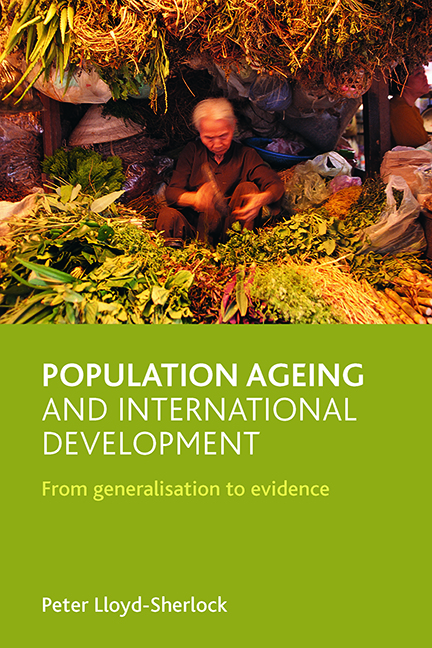Book contents
- Frontmatter
- Contents
- List of abbreviations
- Acknowledgements
- Notes on the author
- Introduction
- one International development and population ageing
- two Experiencing later life in contexts of development
- three Older people, pensions and development
- four Population ageing and health
- five Later life and social relations: family, migration and care
- six Ageing and development in South Africa
- seven Ageing and development in Argentina
- eight Ageing and development in India
- nine Conclusions and overview
- References
six - Ageing and development in South Africa
Published online by Cambridge University Press: 15 July 2022
- Frontmatter
- Contents
- List of abbreviations
- Acknowledgements
- Notes on the author
- Introduction
- one International development and population ageing
- two Experiencing later life in contexts of development
- three Older people, pensions and development
- four Population ageing and health
- five Later life and social relations: family, migration and care
- six Ageing and development in South Africa
- seven Ageing and development in Argentina
- eight Ageing and development in India
- nine Conclusions and overview
- References
Summary
Terminology relating to race and ethnicity are highly politicised, and the precise definitions applied in this chapter are set out in endnote 1.
Introduction
This chapter provides the first of three country case studies, which complement the thematic chapters in the first part of the book. It begins with a general review of South Africa's long-run social and economic development, making particular reference to aspects that shape the lives of older people living there today. Then, the country's main demographic trends are examined. Population ageing is set in a wider context of fertility transition, as well as shifts in life expectancy, living arrangements and the impact of the AIDS epidemic. Predictably, this reveals large disparities between different racial groups. The chapter then turns to two issues that have received particular attention in recent years: the impact of South Africa's much-vaunted social pension programme and the effects of AIDS on older people. After exploring these issues at a general level, three case study life histories of different older individuals are presented. These cannot be taken as representative of national trends, but provide some sense of the diversity of later life experiences and help to illustrate how wider trends can shape individual lives. The chapter concludes with an overview of the key factors that influence the situation of older South Africans, and highlights the importance of mounting social violence, along with the heavy legacy of apartheid.
Social and economic development in South Africa
The emergence of a modern economy and the evolution of apartheid
The history of South Africa has been framed by issues of race and colonisation, and they continue to shape the country's experiences of population ageing and the lives of older people today. Colonisation began in the 17th and 18th centuries when parts of the territory were incorporated into Holland's growing maritime empire. In the 19th century, British imperialism began to encroach, with the establishment of the Cape Colony in 1806. Many settlers of Dutch origin (known as Boers) moved into the interior of the country to set up independent territories such as the Orange Free State. Despite the spread of white control, large parts of the country remained under African rule, most notably the Zulu Kingdom on the east coast.
- Type
- Chapter
- Information
- Population Ageing and International DevelopmentFrom Generalisation to Evidence, pp. 143 - 170Publisher: Bristol University PressPrint publication year: 2010



